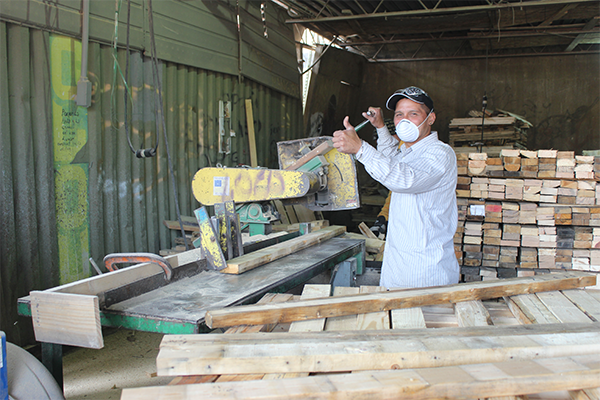By choosing to buy re-manufactured shipping pallets instead of newly manufactured pallets, businesses can save on their packaging and transportation costs.
As anyone who remembers the toilet paper crisis of spring 2020 knows, the ongoing pandemic has affected the availability of numerous products in unexpected ways – and the pallet-based shipping industry has by no means escaped its effects. It may not be obvious to most people how the COVID-19 pandemic could impact the availability of wooden shipping pallets, and in truth a number of factors are in play here, but they all reduce down to a single common denominator: lumber. The US is experiencing a significant lumber shortage, driving up the price of all items manufactured from wood, including new shipping pallets.
Scarcity: Where Has the Wood Gone?
The first seeds of the lumber shortage were planted before the pandemic began. While the US does produce substantial quantities of softwood lumber, it also imports billions of dollars in softwood lumber from Canada each year. In 2017, the Trump administration set tariffs of approximately 20% on softwood lumber imported from Canada, driving up prices on the United States’ primary source of imported softwood. Then came the pandemic.
While many industries saw a shift toward having employees work from home in response to COVID-19 and quarantine precautions, some jobs cannot be done remotely, and the sawmills and factories responsible for domestic lumber production scaled back operations to protect their employees and in response to the economic slow-down.
However, while some sectors of the economy ground to a halt under the stay-at-home orders, other industries (including the real estate market, the home improvement industry, and growing legions of DIYers) remained strong or even grew. Without the option to travel or entertain themselves outside the house, many homeowners found themselves with a pressing need for a home office, a nicer kitchen, a new deck, or a mother-in-law apartment for aging relatives who are concerned about the safety of assisted living facilities during a pandemic. In addition, low interest rates have encouraged home-buyers to upgrade their quarantine living space, and the existing inventory of pre-built homes is tight, spurring the construction of new houses.
Of course, when supply drops and demand rises, some people get scared and others sense opportunity – and the result is the same. Hoarders and speculators alike noticed the shortage of lumber and jumped on any stock that remained, further exacerbating the problem. Market experts agree that prices will self-correct eventually, but can only guess how long it will take. As of early March, the price of lumber per thousand board feet had reached an all-time high, hitting 188 percent of its cost prior to the beginning of the COVID-19 pandemic.
Consequences for the Pallet Industry
Naturally, the construction of new wooden pallets requires lumber, and the most popular type of pallets – stringer pallets – are constructed out of softwood lumber, which is affected by both the 2017 import tariffs and the COVID-19 shortages. As a result, newly-manufactured wooden pallets are more expensive than they would have been a few years ago, and it’s difficult to predict when the prices of new pallets, along with everything else made of lumber, will equalize. Businesses that rely on wood pallets to move their products may expect to find themselves facing substantially increased transportation costs as a result. The problem was summarized succinctly by the secretary-general of the European Federation of Wooden Pallet & Packaging Manufacturers (FEFPEB): “As wood costs account for more than 70 percent of the price of a wooden pallet, then new pallet price increases are unavoidable.” The European market has been facing similar challenges with lumber shortages due to the pandemic.
Refurbished Pallets: The Economical and Responsible Solution
 By choosing to buy re-manufactured shipping pallets instead of newly manufactured pallets, businesses can save on their packaging and transportation costs. That has always been true, lumber shortage or no. However, with soaring lumber prices, the magnitude of those cost savings has grown tremendously, while the reliability of refurbished, recycled, and re-manufactured pallets remains consistently solid. Re-manufactured pallets are constructed from the strong and sound boards reclaimed from broken or damaged pallets, using little or no new lumber. Because re-manufactured pallets aren’t made with new wood, their construction costs aren’t tied to lumber prices, making them much more affordable.
By choosing to buy re-manufactured shipping pallets instead of newly manufactured pallets, businesses can save on their packaging and transportation costs. That has always been true, lumber shortage or no. However, with soaring lumber prices, the magnitude of those cost savings has grown tremendously, while the reliability of refurbished, recycled, and re-manufactured pallets remains consistently solid. Re-manufactured pallets are constructed from the strong and sound boards reclaimed from broken or damaged pallets, using little or no new lumber. Because re-manufactured pallets aren’t made with new wood, their construction costs aren’t tied to lumber prices, making them much more affordable.
In addition, the choice to buy re-manufactured pallets avoids putting any further strain on the lumber market during a shortage. The more the demand for new lumber can be reduced, the more likely it becomes that the shortage will ease and prices will stabilize and self-correct in a timely fashion. This makes the choice to use re-manufactured pallets an excellent cost-saving choice not only in the immediate present, but in the long term as well. With the lumber shortage expected to persist for several months longer at the least, choosing re-manufactured pallets for your shipping needs is as much a practical decision as it is a forward-thinking one.
Greenway Products & Services, LLC is the largest pallet re-manufacturer and recyclers in NY, NJ, PA, MD, and DE. We also accept scrap wood from our customers that we turn into valuable resources. Greenway is a highly-rated, full-service pallet management company. Contact us for a quote today at sales@greenwaypsllc.com. Visit our website, greenwaypsllc.com or call us at 732-442-0200. We can deliver trailers to you on a moment’s notice throughout the NY-NJ-PA-MD-DE area.



Leave A Comment